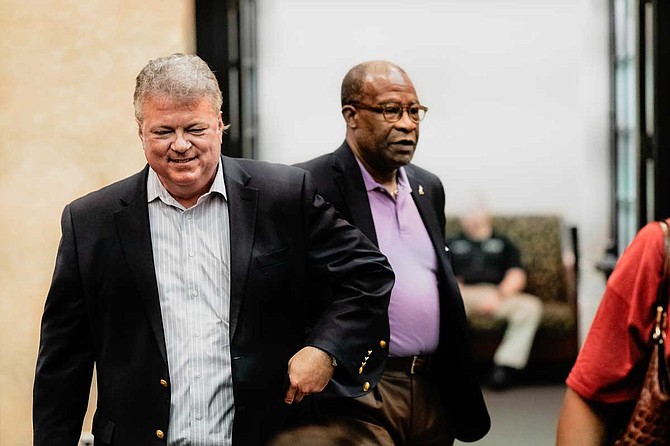Mississippi Attorney General Jim Hood, a Democratic candidate for governor, spoke to former Hattiesburg Mayor Johnny DuPree just before answering questions at a townhall event at the University of Mississippi in Hattiesburg on Apr. 15, 2019. In 2011, Democrats chose DuPree as their nominee for governor and, like Hood now, he ran as an anti-abortion Democrat. Photo by Ashton Pittman.
JACKSON — Abortion-rights activists and some Democratic leaders are unhappy with Mississippi's leading Democratic candidate for governor, state Attorney General Jim Hood, after his office filed a brief in defense of the state's new six-week abortion ban.
If the law survives a court challenge, it would require doctors to check for a fetal heartbeat before performing an abortion, and all abortions would be banned in cases where a heartbeat is detectable. That usually happens around six weeks—before most women even know they are pregnant.
"We should be able to expect better from a Democrat that claims to represent the people," activist Derenda Hancock said in a statement to the Jackson Free Press on Tuesday.
The Pink House Deals With 'Heartbeat Bill' Fallout
"Jesus loves you, mommy. Mommy, please don't kill me," a child's voice pleads from a large speaker system outside Mississippi's last abortion clinic, which is known among its defenders as "The Pink House."
Hancock is an abortion-rights activist who oversees a group of "clinic escorts" who help women avoid protesters as they arrive at the Jackson Women's Health Organization—Mississippi's only abortion clinic.
The Republican-dominated Mississippi Legislature passed the bill and Gov. Phil Bryant signed it into law in March. Within days, the New York City-based Center for Reproductive Justice filed a lawsuit against the new legislation on the clinic's behalf, arguing that it violates women's constitutional rights to abortion that the Supreme Court defined in its 1973 Roe v. Wade ruling.
In the brief Hood filed earlier this month, he argued that the law is legal because it limits abortion but does not outright ban it, echoing a point Bryant made after signing it. That is a dubious argument, though, since most women do not even know they are pregnant at six weeks.
Hood is Mississippi's only Democrat who holds statewide office, and his likely Republican opponent, Lt. Gov. Tate Reeves, galvanized the push for the Legislature to pass the heartbeat bill in March. Because of Mississippi's conservative lean, some Democrats believe they cannot win a statewide election unless they oppose abortion.
'Only a Small Step Above Personhood'
In 2011, Mississippi's Democratic nominee for governor, former Hattiesburg Mayor Johnny DuPree, ran as an anti-abortion Democrat and embraced the Personhood Amendment—a ballot initiative that would have banned all abortions from the moment of conception with no exceptions. Opponents also argued that it would ban in-vitro fertilization and some forms of birth control. Voters rejected the Personhood Amendment by double digits, even as they elected DuPree's anti-abortion Republican opponent, Phil Bryant.
One of the lead voices against the Personhood Amendment in 2011 was Oxford activist Cristen Hemmins. Today, Hemmins is the chair of the Lafayette County Democrats. Despite her leadership position in the party, she spoke out Thursday, telling the Jackson Free Press in a statement that Hood's defense of the six-week ban "infuriates" her.
"Mississippians voted overwhelmingly against Personhood in 2011—almost 59% said no to declaring a fertilized egg a person—because of how dangerous it would be for Mississippi families," she said. "We said we do not want big government interference between a woman and her doctor when it comes to (making) these private and personal decisions. The six-week ban is only a small step above Personhood."
Unlike the Personhood Amendment, the current six-week ban does include an exception for cases in which a woman's life is imperilled. Still, it makes none for cases involving rape, incest or severe fetal deformities.
After the Mississippi Legislature passed a law last year that bans abortions after 15 weeks, Hood defended that law in court, too. The same federal judge in Jackson who is set to hear the lawsuit against the six-week ban next month, Judge Carlton Reeves, struck it down. Hood appealed that ruling on the 15-week ban to the 5th Circuit Court of Appeals in New Orleans, where that law now awaits its next hearing.
In February, Hood told members of the press he is bound to defend laws duly passed by the Legislature.
"I've defended every bill the Legislature has passed on abortion. That's my duty as attorney general," Hood said at the time, adding that he does not "personally believe abortion is right."
In 2016, though, Hemmins pointed out on Thursday, Hood chose not to defend HB 1523, a law that allows certain businesses to discriminate against LGBT people on the basis of their religious beliefs.
"Mississippi's 15-week ban was ruled unconstitutional, so of course a six-week ban will also be ruled as such," Hemmins said. "It makes no sense that Hood would defend it."
Still, Hemmins said, she plans to support Hood, one of the state's most popular politicians and one whom many see as the Democrats' best shot at winning the governor's mansion since 1999. Hood, Hemmins said, supports many things that are important to her as a Democrat, citing his support for fully funding public schools, expanding Medicaid, equal pay for equal work and support for teachers. Republicans, she said, have "ignored or inflamed" those issues.
"So I will gladly vote for Hood over any Republican, any day of the week," Hemmins said. "I only wish he would support Mississippi women the way I know most progressive Mississippi Dems will support him."
'We Need Candidates Who Aren't Afraid'
Laurie Bertram Roberts, who is the co-founder and executive director of the Fund Shack, Mississippi's only abortion fund, told the Jackson Free Press on Wednesday that Hood has an opportunity.
"This is a moment when he can chose to show true leadership and fiscal responsibility," she said. "He can opt out of playing the game Phil Bryant and Tate Reeves set up to pander to their anti-choice donors. Defending this abortion ban is a waste of taxpayer money. It's been shot down in court everywhere it's passed. Playing politics with people's health care is not leadership."
Mississippi: The Battleground for Roe v. Wade’s Future?
Red states, emboldened by the Trump regime, are passing hardline anti-abortion laws aimed at triggering a reconsideration of Roe at the nation's highest court—laws like the fetal heartbeat bills the Mississippi House and Senate passed on Feb. 13.
Last year, after President Trump replaced former U.S. Supreme Court Justice Anthony Kennedy with the more conservative Brett Kavanaugh, anti-abortion activists saw an opening. They flooded state legislatures across the country this year with anti-abortion bills; multiple other states also passed or are considering passing fetal heartbeat bills.
Lea Campbell, the founder and president of Mississippi Rising, a coast-based progressive organization, said she, too, is disappointed in Hood—but not just for his position on the the six-week ban. She also pointed to comments he made at a town hall event at the University of Southern Mississippi in Hattiesburg last week, when he said local school boards should be allowed to decide which bathroom transgender school children get to use.
"Hood's position on defending the heartbeat abortion bill and punting on trans students' rights and safety to individual school districts are the height of hypocrisy," she said in a statement to the Jackson Free Press on Wednesday. "He touts his record as one of protecting children and families, then takes positions that fail to protect women and children."
Campbell also pointed to comments he made to Anastassia Doctor, an African American attendee at last week's town hall, who pushed him to talk about the "racial implications" of old yearbook photos that showed members of his fraternity, but not him, wearing blackface.
In February, Hood told members of the press that he knew he was not in the racist photos because he does not like to put things on his face—not even hunting masks.
"When a candidate for governor of the state with the highest number of recorded lynchings of black people attempts to minimize concerns about his fraternity's history of blackface by comparing it with hunting masks, I have a huge problem with that," Campbell said. "We need candidates who aren't afraid to talk openly about institutional racism, misogyny, homophobia and transphobia in Mississippi, and how we can work together to eliminate it. Until we have those candidates, I will continue to be critical."
'The Supreme Court is Going to Make These Decisions'
On the same day Hood addressed questions about blackface in February, he also answered a question about the fetal heartbeat bill, which the Legislature had not yet passed. While he did not come out against it, he did not endorse it either, saying that would be up to the Supreme Court—not Mississippi's next governor.
"The (United States) Supreme Court is going to make these decisions," he said. "It's not going to be the governor of the State of Mississippi. It's not going to be the Legislature. Now, they'll get out here and run and dupe people. It's awful to try to mislead good, church-going people who vote on one issue—mislead them, and tell them, 'I'm going to stop it,' and 'We're going to do this, rah rah rah.' I'm not going to be that kind of governor."
Abortion-rights activists fear, and conservative lawmakers hope, that the courts will make that decision—and that they could overturn Roe v. Wade completely.
As Mississippi legislators debated the heartbeat bill earlier this year, several Republicans hinted that they believe this abortion ban could fare better in the courts this time around, thanks to the dozens of conservative jurists Trump has appointed to the federal bench.
When asked about the cost of defending the law in court, state Sen. Joey Fillingane of Sumrall and state Sen. Chris McDaniel of Ellisville, who are both Republicans, said it would be worthwhile because, with Kavanaugh on the Supreme Court, anti-abortion legislation now stands a chance.
Lawmakers in Ohio and Georgia have passed their own heartbeat bills since Bryant signed the Mississippi bill in late March.
"We see the Court as being much more favorable to pro-life legislation than it has been in a generation," Ohio Right to Life spokeswoman Jamieson Gordon told NPR on April 12, after the bill's passage there. "So we figured this would be a good time to pursue the heartbeat bill as the next step in our incremental approach to end abortion-on-demand."
Earlier this month, Jackson Women's Health Organization Director Shannon Russell Brewer told the Jackson Free Press the clinic is fielding calls from women who are worried that Mississippi's six-week ban might already be in effect.
"We get patients who call and say, 'I have an appointment next week. Are you guys closed, or have you stopped doing abortions?'" Brewer said on April 4. "That's what we get every day. It's the phone calls asking, 'Are you still here?'"
Hood's office could not be reached for a response before press time.
Follow State Reporter Ashton Pittman on Twitter @ashtonpittman. Send tips to [email protected].
More like this story
- Hood to Appeal Fetal 'Heartbeat' Law Ruling, Citing 'Duty'
- Louisiana 'Heartbeat Bill' Relies on Mississippi Taxpayers' Legal Defense
- Fetal Heartbeat Ban 'A Direct Challenge to Roe,' Activists Warn
- Mississippi AG Candidate Vows to Defend Six-Week Abortion Ban
- Mississippi Advances Ban on Abortion After Fetal Heartbeat
More stories by this author
- Governor Attempts to Ban Mississippi Abortions, Citing Need to Preserve PPE
- Rep. Palazzo: Rural Hospitals ‘On Brink’ of ‘Collapse,’ Need Relief Amid Pandemic
- Two Mississippi Congressmen Skip Vote on COVID-19 Emergency Response Bill
- 'Do Not Go to Church': Three Forrest County Coronavirus Cases Bring Warnings
- 'An Abortion Desert': Mississippi Women May Feel Effect of Louisiana Case





Comments
Use the comment form below to begin a discussion about this content.
comments powered by Disqus